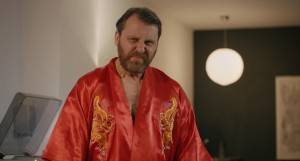I first met Jonathan Owen back in 2013 when I was working on the Cass Pennant documentary Casuals, he was one of the many interviewees who helped to tell the history of the Mod and Casual fashion scene.
As many have testified Jonny is genuinely one of the nicest fellows you’re likely to come across, especially in the entertainment industry, and his winning charm is at the heart of the success of the Svengali project that he has been working on since the first viral debuted on YouTube back in 2009.
The original series of webisodes came to the attention of Mod culture and music fans alike and was hailed by the London Evening Standard as the “best thing on the Internet” at the time. Featuring a smattering of cameos from the world of Rock, including real-life ‘Svengali’ Alan McGee and Carl Barât of The Libertines, it charts the arrival of former Welsh postman Paul ‘Dixie’ Dean in London with high hopes of promoting the raw and rowdy band The Premature Congratulations to the topper-most-of-the-popper-most.
Whilst the five minute virals focused primarily on Dixie’s naivety and his relationship with his old Valley’s oppo Brian Horse(y) now a successful A&R man, whose contacts include all the leading lights of the British music biz, the feature film expands his world turning the spotlight on his long-suffering fiancée Shell played by the redoubtable, BAFTA award winning actress, Vicky McClure.
Along with the central romantic plot line we also finally get to see The Prems as well as an insight into Dixie’s Welsh roots; particularly effective is the scene where his father played by the late Brian Hibbard tells Dixie that he’s not long for life and they share a poetic moment of pure cinematic gold. I come back to this scene time and again, not only has it been made more poignant by Hibbard’s own death not long after the film was completed, but because I can’t tell if it’s totally written or completely improvised, either way it’s a marvelous acting tour-de-force by the two men.
The key thing that the film manages to reveal in far greater depth is the fundamental difference between Dixie and Horsey who, on paper, could be considered two sides of the same coin. Both hail from the same humble beginnings but one has completely reinvented himself cocking a snook at his past, whilst the other totally embraces it. It’s a shame that Roger Evans’ performance as Horsey seems to have been largely overlooked by the critics, barely being mentioned in most of the mainstream reviews that I’ve read, he is the necessary Yin to Dixie’s Yang and the understated combination of embarrassment, envy and bemusement he displays on screen is one of the movie’s core strengths.
Svengali manages to be at once a satire of the music and fashion scene, with Martin Freeman’s Mod-Elite record store owner and Matt Berry’s outrageously intimidating record label boss providing many of the laughs, but it’s also a romantic comedy, a rags to riches story and a buddy movie; this sounds disjointed but it actually holds together very well. This is no doubt due to Jonny Owen’s central performance as Dixie, in the frame almost all of the time his warmth, generosity and sincerity ooze off the screen.
In one of the best scenes an exposed Horsey, who spends all of his time with yes men, cut-throat media types and prostitutes, ponders on what Dixie has that he doesn’t and whilst he narrowly focuses on how he is able to spot musical talent it is apparent that the major thing that Paul Dean has over Brian Horse in his life is love; both familial and romantic. Dixie has kept true to himself and where he has hailed from so consequently, despite walking away from everything he aspired to he retains his dignity and his passion for life.
Svengali has proven that it is possible to make a quality low budget, independent film in the UK that doesn’t have to fit a cookie-cutter mold to reach its audience. The film’s journey echoes Dixie’s spirit in every frame and it’s a testament to everyone who believed in it and worked on bringing it to the big screen over the years. I am very excited to see what Root Films, the joint venture between Jonny Owen and producer Martin Root, do next and I wish them continued success.









